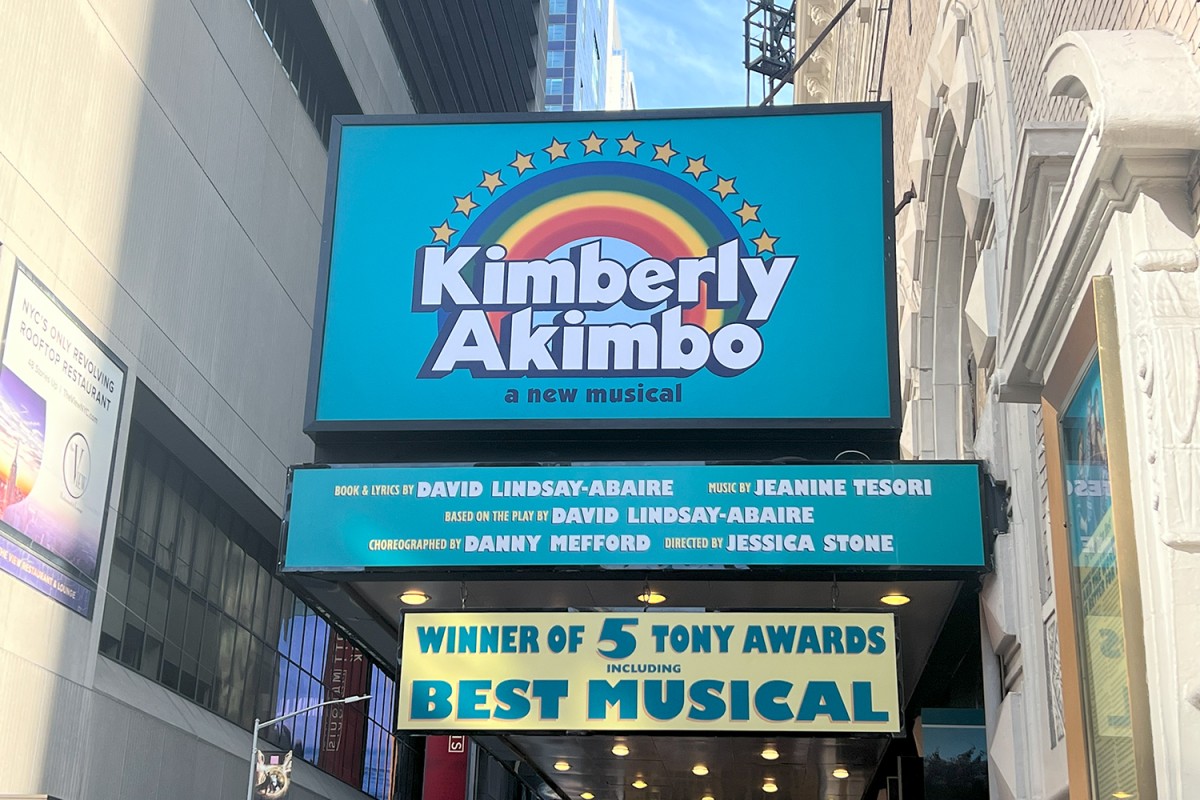This June, the Tony Awards extended its most prestigious accolade, Best Musical, to an unconventional candidate, “Kimberly Akimbo.” When the show opened last year, Broadway — most typically known for its show-stopping dance numbers, sparkling costumes and larger-than-life set pieces, found itself with a show that strayed away from the spectacle. Instead, the musical relied on one thing — its simple story about life and death.
“Kimberly Akimbo,” adapted from the play of the same name by David Lindsay-Abaire, is the story of Kimberly Levaco (Victoria Clark), a 16-year-old girl with a condition that causes her body to age four-and-a-half times faster than most people. With Kimberly’s narcissistic mother Pattie (Alli Mauzey), alcoholic father Buddy (Jim Hogan), and criminal aunt Debra (Bonnie Milligan), this musical is set up to be a perfectly dysfunctional family story.
While the original play includes only the Levaco family, the musical cleverly introduces a quartet of high school show-choir nerds — Teresa (Skye Alyssa Friedman), Delia (Olivia Elease Hardy), Martin (Alex Vinh), and Aaron (Michael Iskander) — that opens the musical as the show’s ensemble. This is also where we meet Seth (Justin Cooley), Kimberly’s classmate and love interest, who works at the local ice skating rink.
The show has a generally upbeat musical score, opening with “Skater Planet,” during which the six teenagers of the show sing about their struggles to fit in. While the show-choir nerds feel ostracized, Kimberly’s isolation reveals that even the outcasts have an outcast, setting the stage for a story of self-realization.
Another standout song is “Anagram” — a duet sung by Kimberly and Seth — wherein Seth works on creating an anagram out of Kimberly’s name, a common quirk of his, while she admires this unique view of the world. While Cooley’s vocals were sometimes unimpressive, particularly so in his ballad “Good Kid,” he makes up for it in “Anagram.” Cooley’s syncopated, rap-like vocal line worked perfectly to offset Clark’s clear and lyrical melody. At the end of the duet, Seth has worked out that the letters in “Kimberly Levaco” can be rearranged into the anagram “Cleverly Akimbo,” explaining the second word of the musical’s name, while smartly inviting the audience to see both Seth’s and Kimberly’s views of the world.
Even though the musical plays heavily into typical coming-of-age tropes, the youthful comedy is juxtaposed with the darker subject of death. Even though Kimberly is mentally a teenager, her rapidly aging body means that her life expectancy is a mere 16 years. With her celebrating her 16th birthday during the events of the musical, Kimberly’s condition creates a morbid undercurrent, making it impossible to ignore the inherent tragedy of the story.
The darkness of the musical is explored deeper in its second act. In the number “Our Disease”, Kimberly and Seth give a presentation on Kimberly’s aging condition for science class. “Getting older is my affliction, getting older is your cure,” Kimberly sings to her classmates. It is here that the audience comes to the sad realization that while her classmates have the ability to grow out of the trials of adolescence, Kimberly will never get to see those days of adulthood herself.
With Kimberly’s metaphorical clock ticking, and her family drama only getting worse, Kimberly realizes that she has to take charge of her own life, rather than expect others to change first.
The musical ends with Kimberly leaving her family and going on a road trip that her parents had once promised her that never became a reality. She visits Six Flags Great Adventure with Seth, and the entire cast comes together to sing “Great Adventure,” an almost jarringly upbeat song about enjoying life because “no one gets a second chance.”
If you can make an audience laugh in the first few seconds of a story, it is impressive if you can make them cry by the end of it. The comedy of “Kimberly Akimbo” eases viewers into a comfortable familiarity with the characters, before confronting them with the inevitability of death. What starts as a simple story of a family living in Bergen County turns into a quest for agency as Kimberly learns to take control of her own life, no matter how long it ultimately is. The show urges audiences to embrace the bittersweet, and live life to the fullest, even in the face of obstacles which threaten to take it all away.
Contach Shiphrah Moses at [email protected].

























































































































































